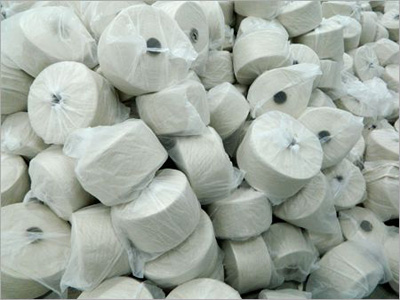 The decline in cotton yarn exports from India during the first quarter of the current fiscal is a matter of deep concern, The Cotton Textiles Export Promotion Council (TEXPROCIL) has said. The organisation has urged the government to extend Rebate of State and Central Taxes and Levies (RoSCTL) scheme to cotton yarn sector at the earliest to avoid layoffs.
The decline in cotton yarn exports from India during the first quarter of the current fiscal is a matter of deep concern, The Cotton Textiles Export Promotion Council (TEXPROCIL) has said. The organisation has urged the government to extend Rebate of State and Central Taxes and Levies (RoSCTL) scheme to cotton yarn sector at the earliest to avoid layoffs.
Cotton yarn exports from India have fallen by a steep 33 per cent from 338 mn kg for the period April-June 2018 to 226 mn kg in April-June 2019, according to the data from the Directorate General of Commercial Intelligence and Statistics (DGCIS), under the Ministry of Commerce.
Exports of cotton yarn have declined from 90 mn kg in April 2019 to 77 mn kg in May 2019, and further to 59 mn kg in June 2019. The June 2019 level of 59 mn kg is the lowest monthly export in the last five years, TEXPROCIL said citing DGCIS data.
As one of the pillars of the Indian textile industry, the cotton yarn sector is highly modernised and technology driven, providing sustainable income to farmers, said TEXPROCIL Chairman KV Srinivasan. Mentioning the reasons for the steep fall in cotton yarn exports, Srinivasan said there has been a decline in exports to leading export markets like China, Bangladesh, and South Korea. Another reason is the duty-free access given for import of cotton yarn by China to countries like Pakistan and Vietnam from April 1, 2019.
“Considering the large-scale investment in the spinning sector and sluggish demand in the domestic market, exports are the only avenue to ensure uninterrupted production and capacity utilisation. “Even though cotton yarn is a value-added product, it has been excluded from the export benefits like interest subvention, Merchandise Exports from India Scheme (MEIS) and the RoSCTL schemes,” said Srinivasan.
He appealed to the government to include cotton yarn in the interest subvention scheme and also rebate the embedded taxes like agricultural cess, mandi tax, power and fuel surcharge incurred in the production process. “The RoSCTL scheme which rebates these levies should be extended to cotton yarn sector at the earliest. This will ensure that only products are exported and not taxes. This will also provide the much-needed impetus in the context of rising cotton prices and appreciating rupee which are eroding competitiveness.” “In case the current trends of declining exports continue in the next quarter, it will lead to closure of several spinning units in the near future, resulting in layoffs,” he added.








